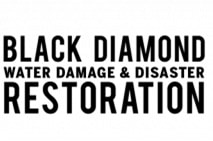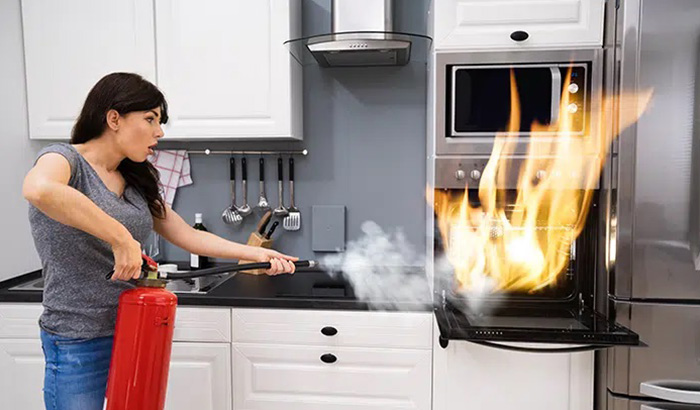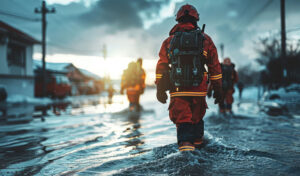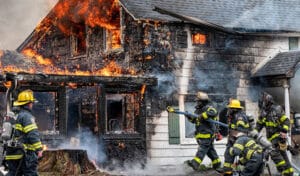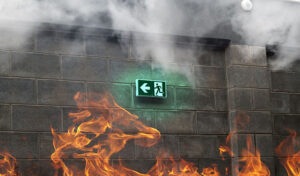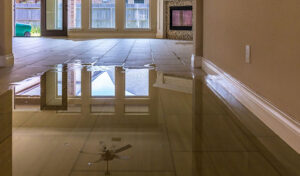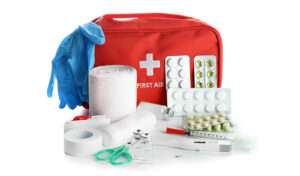The kitchen is the heart of the home, but kitchen fire prevention strategies are crucial as you cook meals and create memories with your loved ones.
Cooking offers a time to come together and forge lasting experiences; however, it’s also a task that poses significant fire risks. Cooking is the leading cause of home fires and home fire injuries in the United States. Taking preventative measures will drastically reduce the risk of a dangerous fire starting and spreading through your home.
Read on for eight fire safety kitchen tips that will help keep you and your loved ones safe as you create in the kitchen. These fire safety kitchen tips will give you the peace of mind you need.
1. Install smoke alarms and make sure they work.
Smoke detectors play a crucial role in early fire detection. They provide an essential early warning that helps make the difference between a manageable situation and a catastrophic event. Smoke detectors should be installed in all key areas of your home, especially the kitchen. Test your devices regularly and replace batteries as necessary to ensure they are always working.
Treat all smoke alarm warnings seriously. It’s easy to ignore if there’s only a puff of smoke, but these devices serve as a warning sign that there’s too much smoke in the house. If your alarm beeps while cooking, turn everything off immediately and open nearby windows and doors to let the smoke out.
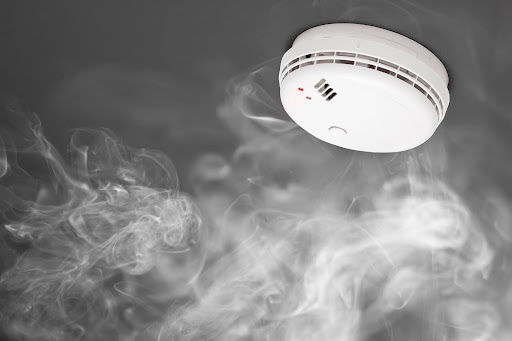
2. Keep a fire extinguisher nearby, and learn how to use it.
The kitchen is the best place to store a fire extinguisher in your home. Having one within easy reach is a lifesaver because, when it comes to putting out fires, every second counts. Choose an extinguisher specialized for kitchen use, such as a Class K extinguisher — designed specifically for cooking oil and grease fires.
Purchasing a fire extinguisher is just the beginning — its life-saving potential remains untapped if you don’t know how to use it. Familiarize yourself with its operation and place it in a location accessible to all family members. Here are four steps, known as the P.A.S.S. technique, to operating a fire extinguisher:
PULL – Pull the pin to break the tamper seal.
AIM – Aim low and point the nozzle toward the base of the fire.
SQUEEZE – Squeeze the handle to release the extinguishing agent.
SWEEP – Sweep from side to side at the fire’s base until it extinguishes. If the fire re-ignites, repeat steps two to four.
3. Never leave food unattended.
One of the most vital kitchen fire safety rules is to never leave cooking food unattended. People are multi-taskers by nature, and it is often difficult to stay solely focused on the kitchen. The TV’s blaring, someone’s texting, you’re watching the kids, and during this, you’re trying to prepare dinner without burning it.
If you’re planning to cook, make sure you don’t also have five other tasks going on at the same time. This is often easier said than done but pay particular attention to food that is on the stove or in the oven. If you’re broiling, grilling, sautéing, or frying food, you’ll want to monitor it closely, prevent grease spills, and flip food over when necessary. A kitchen fire can ignite without warning.
4. Wear appropriate clothing.
Your clothing choices matter when it comes to kitchen fire prevention. While puffy sleeves are perfect for special occasions, it’s not the best idea to cook with them on. Roll up your sleeves or change into a different shirt without loose sleeves and excess fabric that easily catches fire. You should also remove jewelry before turning the heat on.
Similarly, loose clothing can snag on pots and pans, accidentally sending them tumbling to the ground. Temporarily removing these hazards is your best bet to prevent a catastrophe in the kitchen.
5. Be cautious with cooking oils.
Closely monitoring all cooking oil temperatures is another critical fire safety kitchen tip. Not all oils are equal, and that includes their smoking temperature. For example, safflower oil won’t smoke until it reaches 510 degrees, while avocado oil will smoke at 375 degrees. Always research the smoke point for the oil you’re using.
The flash point is another kitchen fire safety rule when working with cooking oils. This is when the oil is hot enough to burst into flames. The easiest way to keep an eye on temperatures while cooking is with a probe thermometer that clips onto the side of the pot. This will monitor the temperature throughout the whole cooking process to keep your food delicious and your family safe.
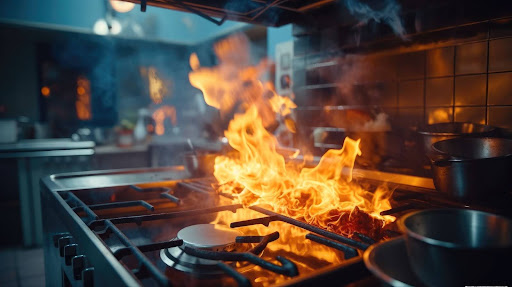
6. Turn off the oven and stove.
It is all too easy to finish cooking but forget to turn off your oven or stove. Having your burner die out is not the only consequence of this oversight — a raging fire can also start. If flammable materials are nearby or the stove malfunctions, it might ignite and lead to a fire. Leaving a stove or oven on can also lead to gas leaks, another fire hazard.
One way to remember to turn off your oven or stove is to turn on your exhaust fan at the same time. If you need an extra reminder, write “Turn off oven/stove” on a sticky note, and tape it to your exhaust fan. Then, every time you turn the fan off to make your kitchen quiet again, you’ll remember to turn the heat off too.
7. Exercise caution with kids.
Distractions are a massive cause of kitchen fires. Because of this, another kitchen fire safety rule is to beware of kids while cooking and preparing food. Teaching your children to cook is formative and fun, but make sure any enthusiasm doesn’t get in the way of common sense. Kitchens are inherently dangerous and the consequences can be severe.
Here are some fire safety kitchen tips to keep top of mind as you share your love of cooking with your children:
- Move appliance cords out of reach of children.
- Designate a “kid-free zone” that is at least three feet away from the stove.
- Teach them about what materials are/are not microwave-safe.
- Keep flammable items well away from the stove.
- Turn the pot and pan handles toward the back of the stove.
- Store knives far away from the counter’s edge.
- Roll up their sleeves and tie back long hair before cooking.
- Teach them to wait until food is fully cooled before tasting.
8. Clean kitchen surfaces.
There are plenty of reasons to keep your kitchen spick and span, but you’ve probably never considered fire safety as one of them. Maintaining clean and clutter-free surfaces keeps the room less flammable. That fine layer of vaporized grease-coating countertops and cabinets encourages a fire to spread rapidly. Scrub all surfaces down daily to prevent this buildup.
Keeping your kitchen clutter-free will also reduce the risk of explosive fire hazards. Store your potholders and dish towels in designated spots well away from the stove/oven. Never store anything above, in, or on your oven and stovetop. Oils, vinegar, spices, or other recurring ingredients should be stored in a nearby cabinet, but not directly next to the stove.
Immediate steps to take after a house fire
Preparing for the aftermath of a house fire is another key component of kitchen fire prevention and safety. Here are some essential steps to take if you fall victim to a house fire:
- Create an emergency exit plan and practice it with your family.
- If you can’t put out a fire using an extinguisher within 10 seconds, evacuate the building.
- Once everyone has exited safely, call 911 for emergency help.
- Do not reenter the property until the fire department has deemed it safe.
- Document any damage for insurance purposes.
- Contact a restoration company to remediate quickly and safely.
Contact Black Diamond Restoration today.
House fires and smoke damage pose a serious threat to your home and health. As a newly minted kitchen fire prevention professional, you know that it’s best to leave fire restoration and cleanup to the professionals. The experts at Black Diamond Restoration are here to help!
Our specialized staff has decades of experience mitigating smoke and fire damage, along with water, mold, storm, and sewage damage. No matter the size of the problem, we’re here to help you restore your home and resume normal living. Contact Black Diamond Restoration at 801-797-2502 or reach out online to schedule your emergency service.
